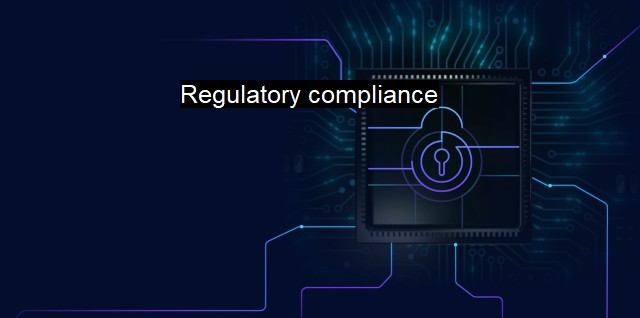What is Regulatory compliance?
The Importance of Regulatory Compliance in Cybersecurity and Antivirus software to Enhance Security and Reliability for Digital Information Handling
Regulatory compliance in the field of cybersecurity and antivirus refers to adherence to laws, guidelines, and specifications that have been relevant to a particular cybersecurity and antivirus framework or model. These regulations are usually enforced by either government agencies or international standards bodies, and they help to ensure the security, reliability, and quality of computer systems, while also protecting individual privacy and promoting the responsible sharing and use of information on these systems.Regulatory compliance dictates the minimum requirements that companies must meet in regards to their handling of digital information, software security, and cybersecurity infrastructure. Businesses are required full compliance to both national cybersecurity laws and global standards like ISO/IEC 27001, General Data Protection Regulation (GDPR), and Cyber Essentials, among others, to prevent data breaches and protect sensitive business and customer information.
Poor regulatory compliance can lead to a variety of severe consequences for a company, ranging from substantial financial penalties through to loss of customer trust and substantial damage to the organization's reputation. It is essential to remember that the process of achieving regulatory compliance begins with an assessment of current cybersecurity approaches, infrastructures, procedures, and protocols in place, so that any identified gaps may be rectified.
The importance of regulatory compliance within the cybersecurity and antivirus realm cannot be overstated. Undoubtedly, the most notable and significant benefit is the protection it provides to individuals and enterprises. Compliance requirements are designed to compel businesses to secure data correctly and simultaneously safeguard vital internal systems against potential threats.
The growth in malware threats continues to be significant. As cybersecurity exploits become increasingly sophisticated, it is critical businesses leverage robust antivirus solutions. A key part of adhering to regulations includes utilizing validated antivirus software to guard against destructive malware that could compromise the integrity of essential data or systems. Therefore, antivirus software is not simply beneficial but a requirement in order to comply with cybersecurity-focused regulations.
In addition to safeguarding data, regulatory compliance also facilitates better business management. It prompts organizations to maintain optimal cybersecurity practices, encouraging thorough audits, better controls, and infrastructure upgrades. Accurate record keeping is also improved, thereby ensuring businesses can better manage and utilize data while also complying with legislation.
Maintaining compliance within a rapidly changing digital landscape can be challenging. But having the right security tools at hand, like efficient and compliant antivirus software, can greatly enhance the task while reducing potential threats. Smaller businesses and startups should prioritize starting their own regulatory compliance procedures early as an integration later may prove to be tough and expensive, due to increased complexity of operations and systems management.
Now more than ever, regulatory compliance in the context of cybersecurity and antivirus is crucial. Not only to avoid fines and legal actions but mainly to build robust cybersecurity measures, optimization of business practices, and defending valuable data from modern threat actors. With developments in the cybersecurity scene, substantial alterations and advancements are made to regulatory standards continuously, demonstrating the dynamic nature of the issue.
The implementation of regulatory compliance procedures in regards to cybersecurity has profound resonance. It affects numerous strategic decisions - from the antivirus solutions used to the way data is managed safely by a company. It fundamentally comprises wholeness of a company's relationship with technology and how data practice risks are classified, mitigated and leveraged for competitive advantage. Therefore, all businesses, irrespective of shape or size, should make concerted efforts to stay vigilant and maintain strict regulatory compliance. Compliance strengthens an organization's cybersecurity posture which results in increased protection and thus maintaining the trust level of consumers and stakeholders.

Regulatory compliance FAQs
What is regulatory compliance in the context of cybersecurity and antivirus?
Regulatory compliance refers to the process of ensuring that an organization adheres to all the relevant laws, regulations, and standards related to cybersecurity and antivirus. This includes measures to protect sensitive data, prevent cyber attacks, and maintain the integrity of systems and networks.Which regulatory bodies govern cybersecurity and antivirus compliance?
There are several regulatory bodies that govern cybersecurity and antivirus compliance, such as the National Institute of Standards and Technology (NIST), the Payment Card Industry Data Security Standards (PCI DSS), and the Health Insurance Portability and Accountability Act (HIPAA).Why is regulatory compliance important in cybersecurity and antivirus?
Regulatory compliance is essential in cybersecurity and antivirus because it helps organizations protect sensitive data, prevent breaches, and avoid legal and financial penalties. Compliance also helps organizations maintain the trust of their customers and stakeholders, and demonstrate their commitment to security best practices.How can organizations ensure regulatory compliance in cybersecurity and antivirus?
Organizations can ensure regulatory compliance in cybersecurity and antivirus by implementing measures such as regular risk assessments, security audits, employee training, and incident response plans. Organizations should also stay up-to-date on the latest regulations and standards, and work with cybersecurity experts who can provide guidance and support in maintaining compliance.| | A | | | B | | | C | | | D | | | E | | | F | | | G | | | H | | | I | | | J | | | K | | | L | | | M | |
| | N | | | O | | | P | | | Q | | | R | | | S | | | T | | | U | | | V | | | W | | | X | | | Y | | | Z | |
| | 1 | | | 2 | | | 3 | | | 4 | | | 7 | | | 8 | | |||||||